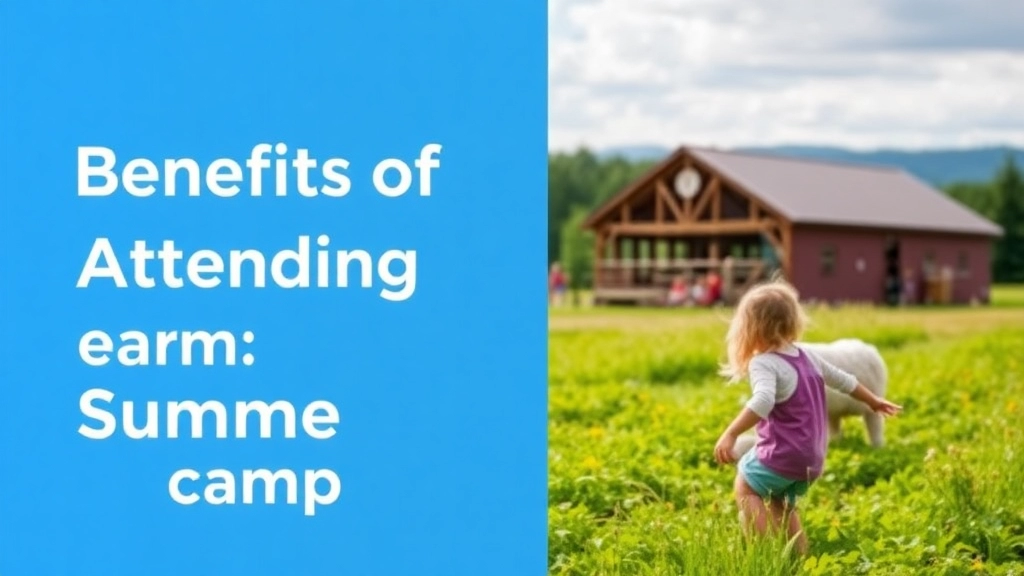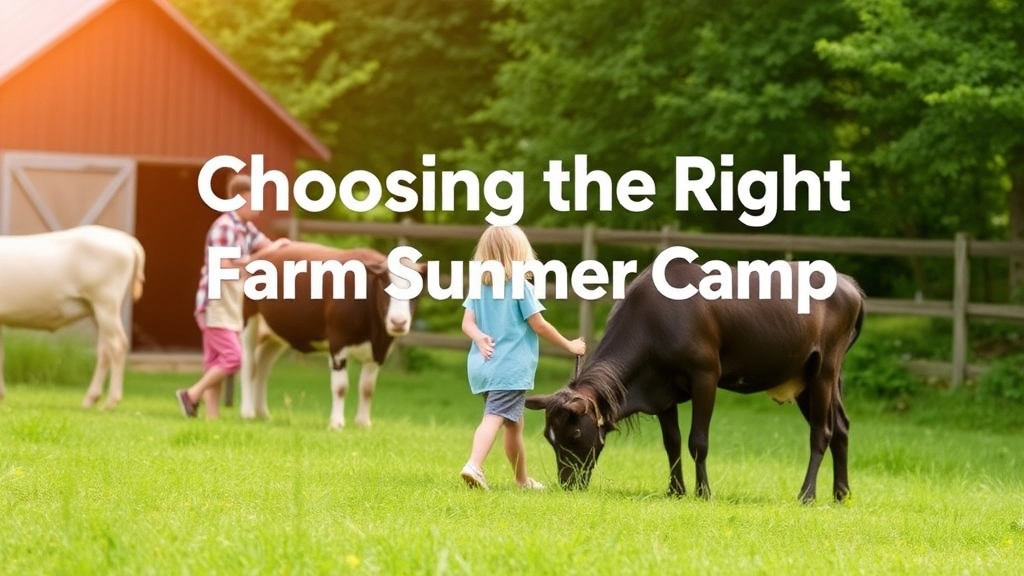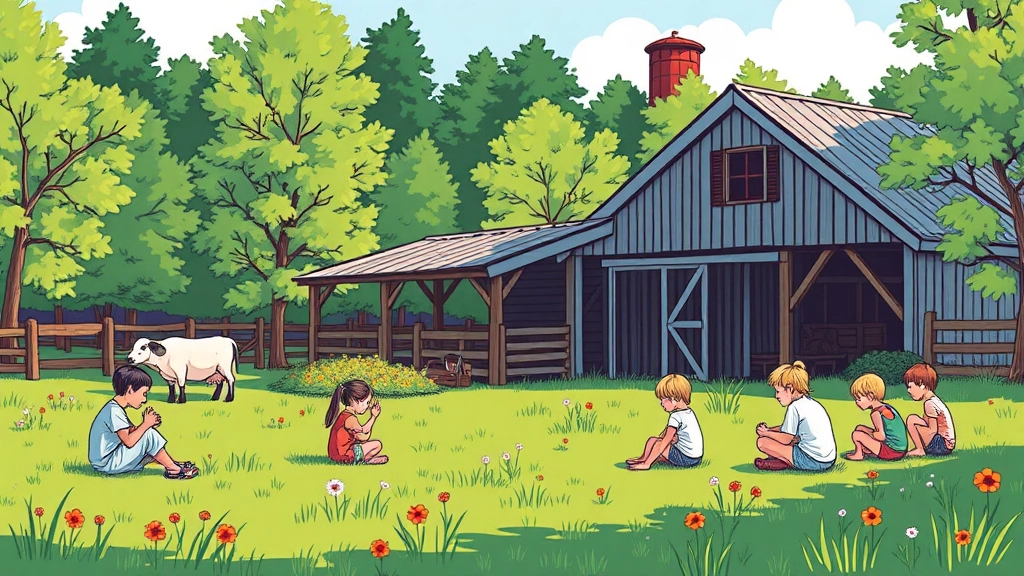Farm Summer Camps: A Unique Experience
Farm summer camps offer a unique and enriching experience for children, blending education with adventure. This article dives into the world of farm summer camps, exploring their numerous benefits, the variety of activities they offer, and how to choose the right one for your child. From safety protocols to age-specific programs, we cover all the essential details to help you make an informed decision.
Benefits of Farm Summer Camps
Whether your child is a nature enthusiast or simply needs a break from technology, farm summer camps provide an excellent opportunity for hands-on learning, physical activity, and personal growth. We’ll also share real testimonials and success stories, giving you a glimpse into the transformative impact these camps can have. So, if you’re curious about sending your child to a farm summer camp, read on to discover everything you need to know.
Overview of Farm Summer Camps
Ever thought about sending your kid to a farm summer camp? Yeah, it sounds a bit out there, but trust me, it’s got a lot going for it. I get it, you might be wondering, “Why would my child need to spend their summer on a farm?” Let’s dive into it.
What’s the Buzz About Farm Summer Camps?
Farm summer camps are exactly what they sound like. Kids get to spend their summer break on a farm, engaging in all sorts of hands-on activities that teach them about agriculture, animals, and the environment. It’s a break from the usual tech-heavy, indoor activities that dominate most kids’ lives today. Instead, they get fresh air, physical exercise, and a chance to learn where their food comes from.
Real Questions Parents Have
- “Is it safe?” Absolutely, we’ll get into the nitty-gritty of safety and supervision later.
- “Will my child actually enjoy it?” If your kid loves animals, nature, and a bit of adventure, then yes, they probably will.
- “Is it worth the money?” We’ll cover the cost and registration process so you can decide if it’s a good fit for your budget.
Why Farm Camps?
Farm camps are not just about milking cows and planting veggies. They offer a holistic experience that combines education, physical activity, and life skills. Kids learn about sustainability, responsibility, and teamwork. Plus, they get to unplug from screens and connect with nature, which is something we all could use a bit more of.
Benefits in a Nutshell
- Educational: Kids learn about agriculture, animals, and the environment.
- Physical Activity: Plenty of outdoor activities to keep them moving.
- Life Skills: Responsibility, teamwork, and problem-solving.
- Unplugged: A break from screens and digital distractions.
- Fun: Let’s not forget, it’s a camp! There are games, crafts, and plenty of fun activities.
Real Stories, Real Impact
I’ve heard countless stories from parents who sent their kids to farm camps and saw a real change. One mum told me her son came back more responsible and even started helping out more at home. Another parent said their daughter, who was initially scared of animals, now can’t get enough of them. These camps can have a lasting impact, shaping kids in ways traditional camps might not.
If you’re interested in exploring more summer camp options, check out our 2024 Summer Camp Guide for a comprehensive overview. For those considering a more specialized experience, our guide on Special Needs Summer Camps might be particularly helpful.
Benefits of Attending a Farm Summer Camp

Ever wondered why farm summer camps are all the rage these days?
I get it.
You want your kid to have a blast, learn something new, and maybe even get a little dirty (in a good way).
So, let’s dive into the benefits of attending a farm summer camp.
Learning Real-Life Skills
First off, your child isn’t just playing around.
They’re learning real-life skills.
- How to grow and harvest crops
- Basic animal care
- Understanding the ecosystem
Imagine your kid coming home and teaching you how to plant a tomato.
Pretty cool, right?
Building Responsibility
Farm camps are a fantastic way to build responsibility.
Kids get assigned tasks.
They have to feed animals, water plants, and even clean up.
These responsibilities teach them the value of hard work and discipline.
Physical Activity
Forget the video games and TV marathons.
Farm camps offer a ton of physical activity.
- Running around the farm
- Lifting hay bales
- Climbing fences
Your kid will be moving all day long, which means they’ll sleep like a log at night.
Social Skills
Then there’s the social aspect.
Kids meet other kids from different backgrounds.
They learn to work together, solve problems, and even resolve conflicts.
It’s like a crash course in social skills.
Connection with Nature
In today’s digital world, kids are losing touch with nature.
Farm camps bring them back to the great outdoors.
- Fresh air
- Open spaces
- Real-life animals
They’ll gain a newfound appreciation for the environment.
Boosting Confidence
Last but not least, farm camps boost confidence.
When kids accomplish tasks, they feel proud.
They see the results of their hard work, whether it’s a sprouting plant or a happy animal.
This sense of achievement is priceless.
Real Stories, Real Benefits
Take Sarah, for example.
She was a shy, introverted kid.
After a summer at farm camp, she came back more outgoing and confident.
She even made a bunch of new friends.
Or consider Liam.
He struggled with responsibility at home.
After farm camp, he started taking care of his chores without being asked.
Types of Activities Offered
Ever wondered what your kids will actually do at a farm summer camp? Trust me, it’s not just feeding chickens and milking cows. Farm summer camps are packed with a variety of activities that keep kids engaged, learning, and having a blast. Let’s break it down:
Hands-On Farming Experience
Your child will get their hands dirty, and they’ll love it. Here’s what they can expect:
- Planting and Harvesting: From sowing seeds to picking ripe veggies, kids learn the entire lifecycle of plants.
- Animal Care: Feeding, grooming, and even mucking out stables. They get up close and personal with farm animals.
- Composting and Recycling: Teaching sustainability in a fun, interactive way.
Educational Workshops
Farm camps aren’t just about physical work. They also offer educational activities that make learning fun:
- Botany Basics: Understanding plant biology and how different crops grow.
- Animal Science: Learning about animal behavior, anatomy, and care.
- Environmental Stewardship: Workshops on conservation and the importance of sustainable farming.
Outdoor Adventures
It’s not all work and no play. Kids will enjoy a range of outdoor activities that make the most of the countryside:
- Nature Hikes: Exploring trails and learning about local flora and fauna.
- Fishing: Basic fishing techniques and catch-and-release practices.
- Camping Skills: Building shelters, starting fires, and cooking over an open flame.
Creative Arts and Crafts
Yes, farm camps also cater to the creative side of your child:
- DIY Projects: Making birdhouses, scarecrows, or even simple farm tools.
- Farm-to-Table Cooking: Using fresh ingredients to prepare simple, healthy meals.
- Nature Art: Creating art from natural materials found around the farm.
Team-Building Activities
Farm camps emphasize the importance of working together:
- Group Challenges: Obstacle courses, scavenger hunts, and team sports.
- Community Projects: Building something together, like a new garden bed or a chicken coop.
- Leadership Skills: Activities that encourage kids to take initiative and lead their peers.
Real Stories from the Farm
Take it from Sarah, a 10-year-old who attended a farm camp last summer. “I loved feeding the goats and picking strawberries. I even made new friends while building a birdhouse. It was the best summer ever!”
Why It’s Worth It
By the end of camp, your child will have gained:
- Practical Skills: From farming techniques to teamwork.
- New Friendships: Bonds formed over shared experiences.
- A Love for Nature: An appreciation for the environment and sustainable living.
For more ideas on how to make your summer camp experience unique, check out our Creative Summer Camp Themes for All Ages. If you’re interested in starting your own camp, our guide on How to Start a Summer Camp is a must-read!
Choosing the Right Farm Summer Camp

Alright, let’s cut to the chase.
Choosing the right farm summer camp can feel like a big deal.
Maybe you’re wondering, “How do I pick the best one for my kid?”
Or, “What should I look out for?”
Here’s the lowdown.
First off, know your child’s interests.
Do they love animals?
Or are they more into gardening and getting their hands dirty?
Different camps offer different focuses, so match the camp to their passion.
Research the camp’s reputation.
Check out reviews, ask other parents, and dig into their history.
A camp with a solid track record is a good sign.
Visit the camp if you can.
Nothing beats seeing it with your own eyes.
Look at the facilities, meet the staff, and get a feel for the environment.
Safety first.
Make sure the camp has strict safety protocols.
Ask about their emergency plans, staff training, and supervision ratios.
Consider the camp’s philosophy.
Some camps focus on education, others on fun and adventure.
Find out what their core values are and see if they align with yours.
Check the schedule.
Does it fit with your family’s summer plans?
And does it offer a good mix of activities to keep your child engaged?
Key Points to Remember
- Match the camp to your child’s interests.
- Research the camp’s reputation.
- Visit the camp.
- Prioritize safety.
- Understand the camp’s philosophy.
- Check the schedule.
Personal Story Time
I remember when I was looking for a camp for my niece.
She was obsessed with horses.
I found a camp that had horse riding lessons and she loved it.
She came back with stories every day, and it was clear she was in her element.
Safety and Supervision in Farm Camps
Worried about safety at farm summer camps? I get it. As a parent, the thought of sending your kid off to a farm camp can be nerve-wracking. What if they get hurt? Who’s watching them? Let’s dive into how farm camps keep your kids safe and supervised, so you can breathe easier.
The Basics of Farm Camp Safety
First things first, safety is the top priority at any reputable farm summer camp. Here’s what they typically have in place:
- Trained Staff: Camp counsellors and staff are usually trained in first aid and CPR. They know how to handle emergencies and keep a watchful eye on the kids.
- Low Staff-to-Camper Ratios: To ensure proper supervision, camps maintain low staff-to-camper ratios. This means your child gets the attention they need.
- Safety Protocols: Camps have strict safety protocols for activities, whether it’s feeding animals or using farm equipment. Kids are taught how to handle everything safely.
Supervision: Who’s Watching the Kids?
You might be wondering, who exactly is keeping an eye on my kid? Good question. Here’s the breakdown:
- Counsellors: These are usually young adults or college students with a passion for farming and working with kids. They undergo rigorous training before the camp starts.
- Specialists: For specific activities like horseback riding or gardening, camps bring in specialists who are experts in those fields.
- Volunteers: Some camps also have volunteers, often parents or community members, who help out under the guidance of the trained staff.
Real-Life Examples
Let me share a quick story. Last summer, my friend Sarah sent her 8-year-old to a farm camp. She was super anxious at first. But the daily updates from the camp, complete with photos and videos, eased her worries. Her son came back not only safe but brimming with confidence and new skills.
Safety Measures You Should Look For
When choosing a farm camp, keep an eye out for these safety measures:
- Background Checks: Ensure the camp conducts background checks on all staff and volunteers.
- Emergency Plans: Ask about their emergency plans and how they handle medical issues.
- Communication: Check if the camp provides regular updates and has an open line of communication for parents.
Final Thoughts
Safety and supervision in farm camps are no joke. These camps go above and beyond to ensure your child is safe and well cared for. From trained staff to strict safety protocols, they’ve got it covered. So, if you’re on the fence, rest assured that your child’s well-being is in good hands. For more information on choosing the right camp, check out our guide on camp counselor duties and transportation tips for camps.
Age Groups and Programs Available

Wondering if your child is the right age for a farm summer camp?
You’re not alone. It’s a common question, and guess what? There’s a program for nearly every age group.
Why Age Matters
Different age groups have different needs and interests. You wouldn’t put a 5-year-old in the same activities as a 15-year-old, right? Camps get this, and they tailor their programs accordingly.
Age Groups Breakdown
- Toddlers (3-5 years):
- Activities: Simple farm chores, petting zoos, basic gardening.
- Focus: Sensory experiences and basic animal care.
- Kids (6-10 years):
- Activities: Planting seeds, feeding animals, arts and crafts.
- Focus: Hands-on learning and fun.
- Tweens (11-13 years):
- Activities: Advanced gardening, animal husbandry, farm-to-table cooking.
- Focus: Skill-building and responsibility.
- Teens (14-17 years):
- Activities: Leadership roles, advanced farming techniques, environmental science projects.
- Focus: Independence and leadership.
Specialised Programs
Some camps even offer specialised programs:
- Eco-Friendly Farming: Learn sustainable practices.
- Animal Care: Focus on veterinary basics and animal welfare.
- Culinary Arts: Farm-to-table cooking classes.
Why This Matters
Choosing the right program ensures your child is engaged and learning at their level. It makes the experience enjoyable and educational.
Real Talk
I remember one parent telling me, “My 8-year-old came home talking about composting like it was the coolest thing ever!” That’s the power of the right program.
In Summary
- Match the age group: Tailored activities make all the difference.
- Specialised programs: Find what excites your child.
- Engagement and learning: The right fit makes camp unforgettable.
How to Prepare Your Child for Camp
Alright, so your kid’s about to head off to a farm summer camp. Exciting, right? But I get itâyou’re probably wondering how to make sure they’re ready for this new adventure. Let’s break it down, step by step, so you both feel confident and prepared.
Real Questions and Worries
First off, let’s tackle some common worries:
- “Will my child be safe?”
- “What if they get homesick?”
- “Do they need special gear?”
These are all legit concerns, and trust me, you’re not alone. Let’s dive into how you can address these and get your child prepped for an awesome camp experience.
Safety First
Safety is a big deal. Here’s what you can do to ensure your child stays safe:
- Pack the Essentials: Make sure they have sunscreen, a hat, and a reusable water bottle. Hydration and sun protection are key.
- Emergency Contacts: Double-check that the camp has your up-to-date contact info and any medical details.
- Teach Basic Safety: Go over simple rules like staying with the group and what to do if they feel unwell.
Gear Up
Don’t stress about buying a ton of new stuff. Here’s a basic checklist:
- Comfortable Clothes: Think layers. Mornings can be chilly, and afternoons warm.
- Sturdy Shoes: They’re going to be running around a farm, so pack some good trainers or boots.
- Personal Items: Label everything! From water bottles to jackets, make sure their name is on it.
Emotional Prep
Homesickness can hit hard, but there are ways to ease the transition:
- Talk It Out: Discuss what they can expect at camp. Share stories if you have any camp experiences.
- Familiar Items: Let them bring a small comfort item, like a favourite stuffed animal or a family photo.
- Stay Positive: Encourage them to see it as an adventure. Your excitement will be contagious.
Skills to Brush Up On
A little preparation goes a long way. Here are some skills that’ll come in handy:
- Basic Hygiene: Handwashing and brushing teeth are non-negotiables.
- Responsibility: Teach them to keep track of their belongings.
- Social Skills: Encourage them to introduce themselves and make new friends.
Final Checklist
Before they head out, double-check these:
- Forms and Permissions: Make sure all paperwork is filled out and submitted.
- Packing List: Go through the camp’s recommended packing list to ensure nothing’s missed.
- Health Check: A quick visit to the GP to ensure they’re fit and healthy can be reassuring.
Preparing your child for a farm summer camp doesn’t have to be stressful. With a bit of planning and some positive vibes, you can set them up for a fantastic experience. Remember, the keyword here is preparation. The more you prep, the smoother the experience will be. Got any more questions? Check out our FAQs section for more tips and advice.
For more insights on choosing the right camp and ensuring safety, check out our sections on Choosing the Right Farm Summer Camp and Safety and Supervision in Farm Camps.
Testimonials and Success Stories

Worried if a farm summer camp is right for your child?
Let’s dive into some real stories and see what others have experienced.
Why Testimonials Matter
You might be thinking, “Is this camp really worth it?”
Hearing from others can help ease those worries.
Real Stories, Real Impact
- Lucy’s Transformation: Lucy was shy and glued to her tablet. After a week at camp, she was buzzing with stories about feeding chickens and planting veggies. Her confidence soared.
- Tom’s Adventure: Tom wasn’t keen on getting his hands dirty. But after trying his hand at milking cows, he couldn’t stop talking about it. Now, he’s the first to volunteer for chores at home.
What Parents Are Saying
- Connection with Nature: Many parents rave about their kids’ newfound love for the outdoors. One parent shared, “My son now prefers hiking over video games!”
- Life Skills: Kids learn responsibility and teamwork. Another parent noted, “My daughter came back more responsible and eager to help around the house.”
Success Stories: A Quick Look
- Confidence Boost: Kids often return home more self-assured.
- New Friendships: Camp is a place where friendships blossom.
- Practical Skills: From gardening to animal care, kids pick up skills they’ll use for life.
Cost and Registration Process
Alright, let’s dive into something that’s on every parent’s mindâthe cost and registration process for farm summer camps. You might be wondering, “How much is this going to set me back?” and “What hoops do I need to jump through to get my kid signed up?” Let’s break it down plainly and simply.
What’s the Price Tag?
First off, farm summer camps can vary greatly in cost. Here’s a quick rundown of what you might expect:
- Day Camps: Typically range from £150 to £300 per week.
- Residential Camps: These can go from £500 to £1,200 per week, depending on the facilities and activities offered.
Yes, it’s an investment, but think about the benefitsâyour child gets fresh air, hands-on learning, and a break from screens. Plus, the memories and skills they gain? Priceless.
What’s Included in the Cost?
Let’s get specific. What does your money actually cover? Most camps will include:
- Accommodation: For residential camps, this is a given.
- Meals: Nutritious, farm-fresh meals are usually part of the package.
- Activities: From animal care to farming workshops, all the good stuff.
- Supervision: Trained staff to keep an eye on your kiddos.
Sometimes, you might need to budget for extras like transportation, special gear, or optional activities. Always double-check what’s included so there are no surprise costs.
How to Register: Step-by-Step
Now, onto the nitty-grittyâhow do you actually sign your child up? Here’s a straightforward guide:
- Research: Start by finding a camp that fits your child’s interests and your budget. Use online reviews, ask other parents, or check community boards.
- Visit the Website: Most camps have detailed info and registration forms online.
- Fill Out Forms: You’ll need to provide basic details about your child, including medical info and emergency contacts.
- Pay the Deposit: Many camps require a deposit to secure your spot. This can be anywhere from £50 to £200.
- Confirmation: Once you’ve paid and submitted the forms, you’ll get a confirmation email or letter. Keep this handy.
- Final Payment: Usually due a few weeks before camp starts. Set a reminder so you don’t miss it.
Early Bird Discounts and Financial Aid
Want to save a few quid? Look out for early bird discounts. Many camps offer reduced rates if you register early. Additionally, some camps provide financial aid or scholarships. Don’t hesitate to ask about these options; it never hurts to inquire.
Real Questions, Real Answers
You might still have questions like, “Is it worth it?” or “What if my kid hates it?” Trust me, these are common worries. Here’s the deal:
- Is it worth it? Absolutely. The skills, friendships, and experiences your child gains are invaluable.
- What if my kid hates it? Most camps have trial days or shorter sessions to test the waters. Plus, the staff are pros at helping kids settle in.
For more detailed information on summer camp costs, you can refer to our comprehensive guide on summer camp costs. If you’re looking for camps that offer transportation services, check out our parent’s guide on summer camps with transportation.
Frequently Asked Questions About Farm Camps
What exactly is a farm summer camp?
Think of it as a summer camp but with a twist. Instead of just the usual activities, kids get hands-on experience with farming. They learn about animals, crops, and the environment.
Is my child too young for a farm camp?
Most farm camps cater to a wide range of age groups. You’ll find programs for kids as young as 4 and up to teenagers. Always check the specific camp’s age requirements.
What kind of activities can my child expect?
A ton! From feeding animals and planting seeds to learning about sustainable farming and even cooking with fresh produce. It’s a mix of education and fun.
How safe are farm camps?
Safety is a top priority. Camps have strict supervision, safety protocols, and trained staff. They also have first aid facilities and emergency plans in place.
What should my child pack for camp?
- Comfortable clothes and shoes
- A hat and sunscreen
- Water bottle
- Insect repellent
- Any medications they need
Check the camp’s packing list for any specific items.
How do I choose the right farm camp?
Look for:
- Reviews and testimonials
- The camp’s safety record
- The types of activities offered
- The qualifications of the staff
Are farm camps expensive?
Costs can vary. Some camps might be pricier due to the range of activities and facilities. Always compare prices and see what’s included in the fee.
How do I register my child for a farm camp?
Most camps have an online registration process. You’ll need to fill out forms, provide medical information, and pay a deposit. Early registration can sometimes get you a discount.
Can my child attend if they have allergies?
Yes, but inform the camp about any allergies. Many camps are well-equipped to handle dietary restrictions and other allergies.
What if my child gets homesick?
It’s normal. Camps usually have strategies to help kids cope with homesickness, like buddy systems and counsellor support.
Any real-life success stories?
Absolutely. Many kids come back with a newfound respect for nature and farming. Some even develop a passion for agriculture or environmental science.
Is there a refund policy if my plans change?
Most camps have a refund policy, but it varies. Always read the terms and conditions before registering.
Why should I consider a farm camp over a traditional one?
Farm camps offer unique learning experiences. Your child learns about where food comes from, the importance of sustainability, and gains hands-on skills that are both fun and educational.
Frequently Asked Questions about Farm Summer Camp
What are the benefits of sending my child to a farm summer camp?
Farm summer camps provide children with an immersive, hands-on experience in nature. Kids learn real-life skills such as crop cultivation, animal care, and an understanding of ecosystems. This kind of environment also helps build responsibility, improve social skills, and offers plenty of physical activity, all while boosting their confidence through achievements.
How do I choose the right farm summer camp for my child?
Choosing the right camp involves considering a few important factors. Start by matching the camp’s activities to your child’s interests, whether it’s working with animals or gardening. Research the camp’s reputation, visit if possible, and always prioritize safety protocols. You should also consider the camp’s overall philosophy and make sure the schedule aligns with your family’s summer plans.
What age groups are eligible for farm summer camps?
Farm summer camps cater to various age groups, usually from toddlers to teens. The activities are age-appropriate, ensuring that younger kids engage in simple farm tasks while older children take on more advanced responsibilities, like leadership roles and environmental science projects. This tailored approach ensures that each child is engaged at their level of interest and development.
Are there specialized programs available at farm summer camps?
Yes, many camps offer specialized programs such as eco-friendly farming, animal care, or farm-to-table cooking classes. These programs allow children to dive deeper into areas that interest them and gain more specialized skills while at camp.
What do parents and kids say about farm summer camps?
Testimonials from parents highlight the benefits their children gained, from increased confidence and responsibility to a newfound love for the outdoors. Many kids return home with practical skills, new friendships, and unforgettable memories. Success stories from past campers often mention how children came back more engaged, self-assured, and excited to share their experiences.
How can I ensure my child’s safety at a farm summer camp?
Before choosing a camp, it’s important to check the camp’s safety protocols. Ask about staff training, supervision ratios, and emergency plans. A camp with a strong focus on safety will give you peace of mind while your child enjoys their time outdoors.
What are the key points to remember when choosing a farm summer camp?
To sum up, when selecting a camp, ensure it matches your child’s interests, research its reputation, prioritize safety, and ensure the camp’s schedule fits your plans. This will help ensure a rewarding and fun experience for your child.
References
-
Benefits of Summer Camp
-
How Summer Camp Benefits Kids
-
Why Summer Camp is Great for Kids

